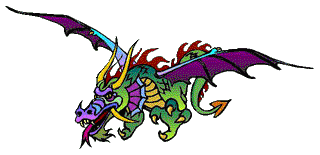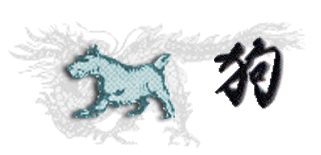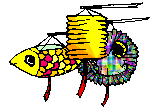
HOLIDAYS 

Chinese New Year - January 29, 2006
~The Year of the Dog
| 2006 | Jan. 29 |
| 2007 | Feb. 18 |
| 2008 | Feb. 7 |
| 2009 | Jan. 26 |
| 2010 | Feb. 14 |
| 2011 | Feb. 3 |
Year of the Dog


Chinese or Lunar New Year is the longest and most important festival in Taiwan. Customs include paying off debts, purchasing new clothes, thoroughly cleaning the house, enjoying sumptuous family feasts, offering sacrifices to the gods, and giving friends and relatives "red envelopes" containing "lucky money." Firecrackers explode throughout the night on New year's Eve and sporadically on the following days.
New Year's Eve and the first three days of the new year are observed as a pubic holiday, although this break sometimes lasts up to a week. Movie theaters and major restaurants are essentially the only businesses open during the holiday. People return to work between the fifth and eighth days of the new year, but the holiday atmosphere lasts through the Lantern Festival, on the 15th day of the first lunar month.

Lantern Festival
The people of ancient China believed that celestial spirits could be seen flying about in the light of the first full moon of the new lunar year. Over time, their torch-lit search for spirits evolved into the Lantern Festival, now celebrated in temples and parks with colorful lanterns.
Traditionally, Chinese parents prepared lanterns for their children to carry on the school day of the new year to symbolize the hope that the children would have bright futures. In modern Taiwan, small children carrying lanterns roam the streets on the evening of the festival.
The Taipei Lantern Festival, held at the Chiang Kai-shek Memorial Hall, features thousands of elaborate lanterns, dragon and lion dances, folk arts demonstrations, acrobatic performances, and ceremonial temple processions. This grand, three-day celebration B Chinese culture attracts millions of revelers every year.
The week-long Tourism Festival is held during the same week as the Lantern Festival, and is an excellent time to tour the island since many tourist hotels offer room discounts and major scenic spots have reduced admission.
One of the world's most unique festivals, coinciding with the Lantern festival, is the famous "rocket hives" fireworks show at Yenshui. For nearly 200 years the town has fired off these "hives," each of which launches of large, un-aimed bottle rockets, to commemorate a successful fight against a plague. But beware , even with protective clothing, eye injuries and burns occur.
Moon Festival
Learn More
The Moon or Mid-Autumn Festival, on the 15th day of the eighth lunar month, observes the biggest and brightest full moon of the year, the harvest moon.
One legend about the Moon Festival concerns expert architect Hou Yih, who built a palace of jade for the Goddess of the western heaven. In reward, she gave Hou Yih a pill with the elixir of immortality, warning him not to take it until he had fulfilled certain conditions. Hou Yih's ever-curious wife, Chang O, found the pill and promptly swallowed it. As punishment, she was banished to the moon where, according to tradition, her beauty is at its most radiant on the day of the Moon Festival.
The Festival is a public holiday marked by family reunions, moon gazing, and the eating of moon cakes-round pastries stuffed with red bean paste and an egg yolk, or fruit and preserves.
The above poem is by the great Tang poet Li Shang-yin(812-858 A.D.). Naturally enough, its title is Chang-o
. "Chang-o is the most beautiful woman of Chinese mythology. The story goes that she stole the elixir of life that her husband had obtained with great difficulty from the Royal Mother...
Although modern science has allowed us to explore, study, and walk on it, the moon has held fast to its mystical qualities. Historically the moon was a timepiece. The Chinese, being an agricultural people, planted and harvested by the moon. For these reasons, the Chinese have given special attention to the moon in times of worship. During the Tang dynasty (A.D. 618-906) the 15th day of the eighth lunar month was made an official holiday-Moon Festival. The Chinese people have a legend or a fairy tale for everything, and the moon is no exception.